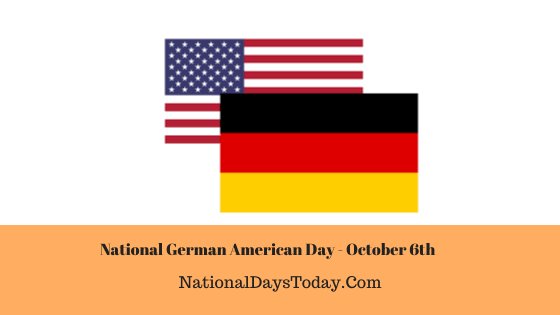National German American Day
National German American Day:
Celebrated on October 6th every year. The day is celebrated to honor the Germans who landed in the American Colony during the year 1683.
| Year | Date | Day | Where |
| 2023 | 6th October | Friday | United States |
| 2023 | 6th October | Sunday | United States |
| 2025 | 6th October | Monday | United States |
Twitter Hashtags:
#NationalGermanAmericanDay
#GermanAmericanDay
Related: Other National Days Celebrated on October 6th:
National Plus Size Appreciation Day
Why German American Day?
The day is celebrated to honor the Germans who landed in the American Colony during the year 1683. Germans and we share a great bond and we always overwhelmed by the contributions of German heritage in the American Soil. They came to our country before some 340 years and we are like brothers and sisters. Germans constitutes around 15 percent of the U.S Population. And, this day is to thank them all.
How we can Celebrate or Observe National German American Day:
Use this hashtag #GermanAmericanDay to post on social media. share the significant role of Germans and their heritage and also the things we learnt from them using the same hashtag. First kindergarten in the United States was established by German-Americans. Not only this, their contributions are infinite. Share if you know any.
Interesting Facts About German American Day:
- October 6, 1683, 13 German families from nearby Rhine landed in Philadelphia, which was under the rule of British crown. Immediately, they founded Germantown in Pennsylvania. Germantown is in northwest of Philadelphia. Originally formed as an independent borough, it was later included as a part of Philadelphia. It was incorporated on August 12; 1689.
- Germantown contributes a magnificent role in American History. The First Anti-slavery movement was started only in Germantown. In 1688, they petitioned to the British in order to abolish slavery and sowed for American Independence from the British rule. Perhaps, it is one of the sites of American Revolutionary war.
- The United States first bank is situated at Germantown only and thereby it remains one of the historical places of the United States right from the colonial period. Not only that, the first church of Brethren group prayers were held at Germantown in the year 1723. In 1883, to mark the 200″ anniversary observance, migrants celebrated the first National German Day in Philadelphia.
- Later it spread to most part of the country. Originally, it was celebrated as only Germany day until World war. During the wartime, Germany had become a rival to the Americans and due to anti-German feeling, the day was subsequently not celebrated and the bill was withdrawn.
- However, during the year 1983, the then president Ronal Reagan’s official visit to West Germany had paved the way to revive the bill and the celebration was started celebrated as “National German-American Day” upon Reagan’s proclamation.
- Germans constitutes around 14.5 percent of the U.S population and primarily settled in Philadelphia, New York and Virginia with Philadelphia ranking on the top by constituting around 3.5 million of German ancestry people. They are notably called as German-Americans since they are Germans or partially Germans by their ancestral origin.
History of German American Day:
National German-American day was observed right from the nineteenth century. Due to World War I, the relationship between the two countries was strained and the day has been officially abandoned. During the year 1980, things were changed and the then president of the United States, Ronal Reagan visited West Germany as a part of traditional tour in the year 1982, where he addressed about the 13 German families migration to an American colony and the formation of German town in Pennsylvania on October 6, 1683.
He also praised about their contribution in various fields for more than 300 years. To commemorate their contribution, he officially declared October 6 as the National-German Day in the year 1983. From then onwards, the day was declared as a holiday and being celebrated on an annual basis.


